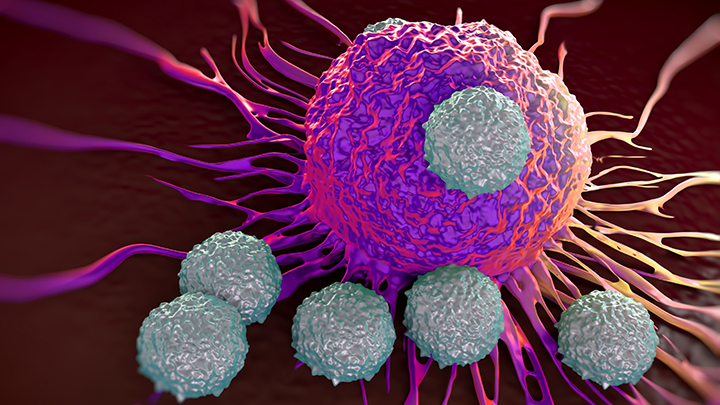Cancer
Our cancer research includes translational approaches for pancreatic cancer, melanomas, the cancer-promoting immune cells, macrophages, and cancer recurrence, chemo-resistance and metastatic disease.

View researchers
School of Pharmacy and Biomedical Sciences
Professor Marco Falasca
Professor Falasca’s principal scientific interest is to investigate the molecular mechanisms involved in pancreatic biology and malignant transformation, with a particular focus on translational approaches for pancreatic cancer and diabetes.
Professor Deirdre Coombe
Professor Coombe and Dr Danielle Dye’s research focuses on melanoma cells interactions with the extracellular matrix, and melanoma cell migration through the tissue extracellular matrix, as a key step in the formation of metastatic lesions. A cell adhesion protein (MCAM) that is very highly expressed on metastatic melanoma cells, but is absent from nevi and non-metastatic melanoma, has been a topic of considerable interest. With input from Dr Carl Mousley, the pathways involved in the endocytosis of MCAM, and its re-expression on the cell surface, have been an area of investigation.
Associate Professor Delia Nelson
Associate Professor Nelson is interested in understanding how the function of innate and adaptive immunity is modulated by the presence of a progressing tumour; the impact ageing exerts on immune function; as well as the impact of standard cancer chemotherapy, immunotherapies, gene therapies and/or vascular targeting therapies on immune function.
Dr Nina Tirnitz-Parker
Dr Tirnitz-Parker heads the Liver Disease and Regeneration Group. Their research investigates how liver progenitor/stem cells regulate wound healing, fibrogenesis and carcinogenesis in progressive chronic liver injury, with particular emphasis on cytokine and chemokine signalling pathways. Recent studies have been focussed on liver progenitor cells as regulatory cells in tumour niche development or as potential cancer stem cells in hepatocellular carcinoma and cholangiocarcinoma.
Dr Pat Metharom
Dr Metharom investigates the activity of platelets, the key mediators of haemostasis, across different pathologies. Their interest in the field of cancer research focuses on understanding how the interplay between platelets, the body immune response and tumour cells influences metastasis, chemoresistance and hematologic complications of cancer.
Dr Mark Agostino
Dr Agostino is a structural bioinformatician, using computational methods to investigate the structural basis of interactions between molecules of biological interest, as well as to facilitate structure-based drug design. Current projects include understanding the structural basis of interactions in the Wnt signalling pathway (particularly between Wnt, LRP, Frizzled and Dishevelled), and understanding the structural basis of peptide and protein mimicry of tumor-associated carbohydrate antigens.
Dr Connie Jackaman
Dr Jackaman is currently leading a team investigating the role of cancer-promoting immune cells, known as macrophages, in the elderly. This includes addressing the molecular mechanisms that impact anti-tumour immune responses during aging. This project is in collaboration Associate Professor Delia Nelson and Associate Professor Fiona Pixley, from the University of Western Australia.
Professor Arun Dharmarajan
Professor Dharmarajan focuses on the mechanistic and structural aspects of Wnt Signalling, in particular Wnt antagonist Secreted Frizzled Related Protein-4 (SFRP4) for the development of targeted cancer therapies.
Associate Professor YU YU
Dr Yu’s research focus on cancer recurrence, chemo-resistance and metastatic disease. She uses omics technology to study biospecimen and preclinical models to develop new drugs and biomarkers.
Associate Professor Pritinder Kaur
Associate Professor Kaur is an epithelial stem cell biologist with an interest in understanding the specific cellular and molecular interactions between human epithelial stem cells, and their mesenchymal microenvironment, in the context of skin regeneration, wound healing and cancer. Human skin has been used as a workhorse in the lab, however findings in this tissue have been extended to many other epithelia including oesophageal, gastrointestinal and ovarian cancer.